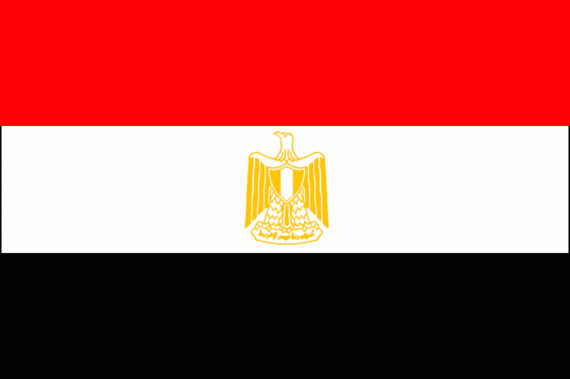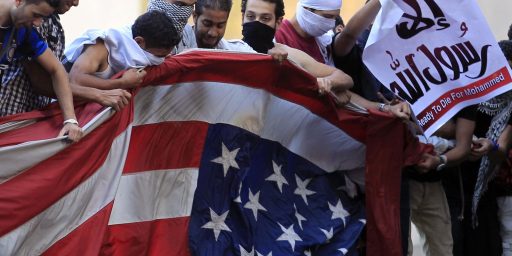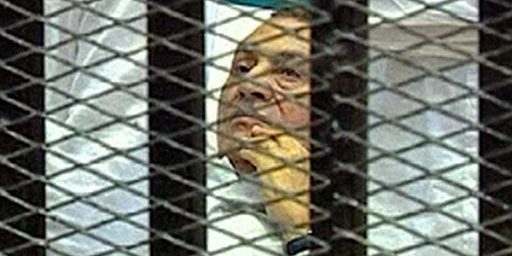Egyptian Military Affirms Primacy Of Civilian Rule
The Egyptian military is promising a quick transition to new civilian leadership. Will they live up to their promise?
On the first day of the new Egypt, the military leadership promised a quick transition to civilian rule:
CAIRO — A new era dawned in Egypt on Saturday as this nation of 80 million — and hundreds of millions beyond its borders — began to absorb the fact that an 18-day mass movement of largely nonviolent protest brought down a nearly 30-year military dictatorship and renewed the country’s lease on life.
Within hours of the news that Hosni Mubarak had resigned as president, Egypt’s new army leadership quickly sought to project its control and assuage fears about military rule, at home and abroad. At the same time, opposition leaders took steps toward asserting their own role in the country’s future.
In an announcement broadcast on state television on Saturday, an army spokesman said that Egypt would continue to abide by all of its international and regional treaties — which include its peace treaty with Israel — and that the current civilian leadership would manage the country’s affairs until the formation of a new government, without giving a timetable. The spokesman said “a peaceful transition of power” would allow “an elected civilian state to rule the country for building a free democratic state.”
Some current members of the government had been barred from traveling abroad, The Associated Press reported, quoting an official at the Cairo airport.
The army spokesman urged citizens to cooperate with the police, after weeks of civil strife, and urged a force stained by accusations of abuse and torture to be mindful of the department’s new slogan: “The police in the service of the people.” Earlier, the defense minister, Field Marshal Mohamed Hussein Tantawi, drove to Tahrir Square, the epicenter of the new Egypt. However, he did not leave his car.
As the impact of the revolution settled in, some members of the movement that toppled Mr. Mubarak vowed to continue their protests, saying that all their demands had not yet been met — including an end to the emergency law that allows detention without charges, and the release of political prisoners.
At a news conference, a group called the Coalition of the Youth of the Revolution said it had not yet talked with the military and would lay out a roadmap for the future. It also said protesters should leave Tahrir Square and return next Friday to honor those who had died in the protests.
The big test for a military coup is always how willing they are to cede back the control they’ve taken. In Egypt’s case, the extent to which the public has become engaged over the past three weeks seems to make it unlikely that they’d be able to turn Egypt into a military state. However, stranger things have happened and the Egyptian military now seems to have tied itself inexorably to the “stability” of the state. The next move is in their court.







OTB seems to be pushing the “Military coup” line pretty hard. Why can’t we give the people in Egypt some credit for what they have accomplished? Perhaps Muslims overthrowing a dictator on their own and moving towards democracy without the benefit of the U.S. killing a lot of people first does not fit into the GOP narrative.
It’s early days and we’re clearly heading into six months of confused horse trading but the level of popular expectation that exists is going to be hard to divert I would have thought. Obviously, the military are going to do all they can to protect their economic and social privileges but ultimately we’re going to see something that approximates to a functioning democracy with all it’s imperfections. What happens after this is more opaque. Inevitably the Muslim Brotherhood is going to be a big if not majority player although it is not remotely as monolithic as American neocons would have you believe. It’s certainly not Hezbollah. That said any democratic govt that emerges is going to be much more anti Israel than the current one but that doesn’t necessarily have to mean it’s a strongly anti American govt. Our subsidies and a perception amongst the educated classes that the US has played a restraining role during this crisis and in the months ahead could work in our favor. If the US plays its cards well and we have so far there’s no reason why this has to be all negative. At bottom the average Egyptian is not very unlike us in his aspirations.
> At bottom the average Egyptian is not very unlike us in his aspirations.
Wait, wait. What are you saying? Scary Muslims! World wide caliphate! You will be converted at the point of a sword!
You are quite right. The average Egyptian is not very unlike us in his aspirations. How will the right spin the fact that millions of them went out into the streets and were prepared to die for, gasp, freedom?
“OTB seems to be pushing the “Military coup” line pretty hard.”
They are and it doesn’t matter how many times you provide an OED definition that the events in Egypt don’t exacly fit this definition. Yesterday we had the extraordinary spectacle of a professor of political science claiming the OED definition was wrong. Generations of scholars and etymologists apparently don’t know what they are talking about. The military has been handed a caretaker role to supervise the transition. It’s a contingent lease on power not a freehold. Apart from the misuse of the word however, I wouldn’t really disagree with Doug’s characterisation of what lies ahead.
“How will the right spin the fact that millions of them went out into the streets and were prepared to die for, gasp, freedom?”
I’m sure they’ll find a way. They are very creative. To be fair I think the right is somewhat divided over this but you’re correct, the events of the last week hardly play to the standard right wing demonology of knife wielding muslims coming to murder your children. If we had any sense, once they have a govt in place, we’d give them ten billion for an infrastructure program that would use lots of US materials and equipment. That btw is roughly 8% of what we’re spending annually in Afghanistan and Iraq ( a fair proportion of which ends up in the hands of the Taliban so they can continue to kill our guys.)
It was a Military Coup. Period. Otherwise, by now the Mobrohood chief head chopper would have hoisted Hosni Mubarak’s head on a pike for Al Jazeera, CNN and assorted infidels to ogle.
Because an OED definition is not the definitive last word on the subject. Forget whether “coup” is the right word for the moment–I find it even more problematic that you keep acting as if all one has to do is quote the OED and it is QED time.
Dictionary’s provide basic, general word meanings. They do not provide the complete, final and total picture of the meaning of complex social phenomena. They simply don’t. They are a starting spot on the road to understanding something, not the destination.
@anjin-san:
Regardless of whether the protests help allow the coup to take place does not mean that it wasn’t a coup.
What else does one call an extralegal taking of power by the armed forces?
And as I keep trying to point out: just because it was a coup doesn’t mean that it automatically will result in a military dictatorship. It just describes the method be which the old holders of power became the new holders of power.
What else do you all want to call it?
And I would underscore: the people don’t currently hold power. The military high command does.
> What else does one call an extralegal taking of power by the armed forces?
I don’t have the sense that the rule of law meant a whole heck of a lot in Mubarak’s Egypt. I believe the constitution there was supposed to support a representative form of government, which it clearly was not doing.
Perhaps we need to come up with some new nomenclature. Are there some sociologists out there that can weigh in? I would like to have some language to accurately describe the current situation, and at the same time credit the people of Egypt for taking action and making it impossible for a dictator (or at least this dictator) to remain in power. Event there are probably far too complex to be properly described by a two word phrase, especially one so loaded with negative connotations.
We will have to see how events unfold. Hopefully the people of Egypt will be able to show us all a thing or two about how to spread democracy. In this country, we have talked a better game in this century that we have actually played.
I still have no idea why Taylor has conceded that the OED definition excluded the events in Egypt from the definition of coup. It only needs to be one of the three: sudden, violent, or illegal. It was sudden *and* illegal. Two out of thee ain’t bad!
@TG:
It is less a question of conceding anything as much as it is being utterly flabbergasted by the insistence that waving a dictionary definition around constitutes an argument.
Because an OED definition is not the definitive last word on the subject.
No Steven generations of scholars and etymologists at the OED couldn’t produce anything approximating an accurate definition of the expression Coup D’etat while you can. A Coup involves the violent or non violent seizure of power by a group. This has simply not occurred. Accept the fact with good grace and move on with your usually perceptive commentary.
Joe:
If only life were so simple that complex social phenomena could be understood by look up a one sentence definition!
There would be no debates about when life begins (just look it up in the OED!) or what commerce means (just look it up in the OED!). Heck, why don’t we fire the Supreme Court and just get a guy who can look stuff up in the OED. We really don’t need doctors, lawyers, teachers because the full meaning of any word/concept is encapsulated in the OED definition.
Again: a dictionary, even the OED, is a basic starting point for understanding the meaning of a word. It is not a complete and total gateway into full understanding. If it was, then I am wasting my students’ time lecturing on these things and I am wasting time writing about them. Further, I wasted a lot of years in school.
BTW, as I noted elsewhere, the thing that I find the most problematic about this discussion is that you want to argue over whether a coup took place or not, but your utter insistence that the OED is all you need to make the argument.